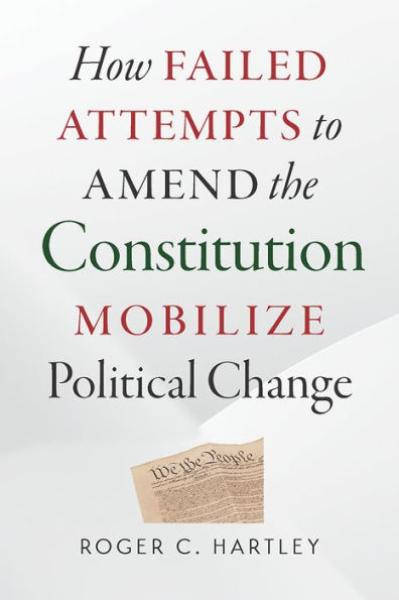Description
This book is a demonstration of how social reformers and politicians have used the amendment process to achieve favorable political results even as their proposed amendments have failed to be adopted. For example, the ERA failed in the sense that it was never ratified, but the mobilization to ratify the ERA helped build the feminist movement (and also sparked a countermobilization). Similarly, the Supreme Court's ban on compulsory school prayer led to a barrage of proposed amendments to reverse the Court. They failed to achieve the requisite two-thirds support from Congress, but nevertheless had an impact on the political landscape. The definition of the relationship between Congress and the President in the conduct of foreign policy can also be traced directly to failed efforts to amend the Constitution during the Cold War.
Roger Hartley examines familiar examples like the ERA, balanced budget amendment proposals, and pro-life attempts to overturn Roe v. Wade, but also takes the reader on a three-century tour of lesser-known amendments. He explains how often the mere threat of calling a constitutional convention (at which anything could happen) effected political change.
The paradox of the difficulty of amending the Constitution
Roger C. Hartley, Professor of Law at the Catholic University of America, teaches constitutional law and labor law. He is co-author of Labor Relations Law in the Private Sector.
[Hartley] offers a good answer to skeptics (like this reviewer) who have questioned why rational persons would invest scarce time, money, and energy in an enterprise that Article V of the Constitution makes nearly impossible--the formal amendment of the Constitution. . . . [A]n excellent example of how to mine American political history . . . [A] genuine pleasure to read. It prompted me to rethink some of my own views about the value of looking at efforts to amend the Constitution as a part of the ongoing political process, independent of their formal success.
--Journal of Interdisciplinary History
A fascinating and important examination of the political significance of the constitutional amendment process. Although the Constitution has been amended only seventeen times since 1791, Hartley persuasively shows that the amendment process is crucial as a way of mobilizing people and furthering social change. Hartley's book is clearly written and very impressive in its thoroughness. This will be a key work in all future discussions of the constitutional amendment process.
--Erwin Chemerinsky, Dean of the School of Law and Raymond Pryke Professor of First Amendment Law, University of California, Irvine
At a time when so many commentators are announcing the premature end of the constitutional amending process (or the need further to democratize it), Hartley makes a compelling case in this book that amending provisions are already working better than most scholars realize. More particularly, Hartley demonstrates that proposed amendments often mobilize support and influence laws even when they do not succeed in being added to the constitutional text. This is an important contribution to the literature on the amending process.
--John R. Vile, Professor of Political Science and Dean of the Honors College at Middle Tennessee State University, and author of The Encyclopedia of Constitutional Amendments, Proposed Amendments, and Amending Issues, 1789-2015 and Conventional Wisdom: The Alternate Article V Mechanism for Proposing Amendments to the U.S. Constitution
Conventional wisdom holds that it's impossible to amend the Constitution. The wisdom is right, as a formal matter. But Roger Hartley's compelling account demonstrates that such efforts, even though they virtually always fall short of a formal amendment, have been critical factors in advancing constitutional rights in less formal ways. An invaluable lesson in how one can win through losing.
--David Cole, Professor, Georgetown Law, and author of Engines of Liberty: The Power of Citizen Activists to Make Constitutional Law
Hartley provides a comprehensive and useful framework for thinking about the role that efforts to pass constitutional amendments, especially those efforts that fail, play in constitutional, political, and social change. Through Hartley's lens, we see how failed attempts to change the text of the Constitution may actually spur constitutional change by voicing and channeling arguments about what the Constitution's existing text does and should mean.
--Douglas NeJaime, Professor of Law and Faculty Director of the Williams Institute, UCLA School of Law
With insightful examples, Roger Hartley explains how the political initiative of failed amendments can force rethinking and corrections in judicial rulings, illustrating how the general public often understands the Constitution better than the Supreme Court.
--Louis Fisher, Scholar in Residence, The Constitution Project
Product Details
- Vanderbilt University Pre Brand
- Aug 1, 2017 Pub Date:
- 0826521495 ISBN-10:
- 9780826521491 ISBN-13:
- 264 Pages
- 8.9 in * 6.1 in * 0.7 in Dimensions:
- 1 lb Weight:




